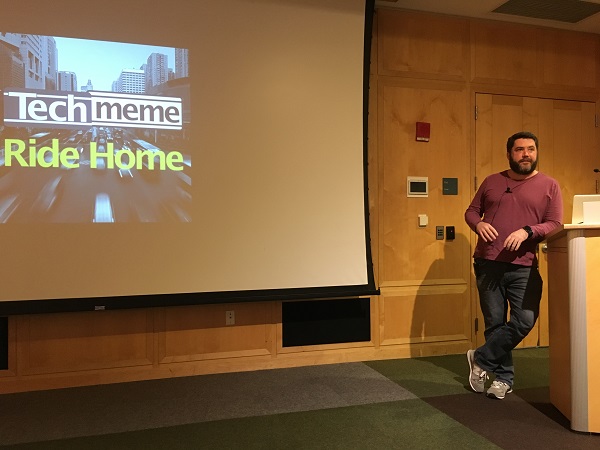History of the Commercial Internet Brought into Focus by Brian McCullough at Princeton Tech Meetup
You probably think you know everything there is to know about the internet, but Brian McCullough, a 20-year veteran of the internet industry and the founder of various web-based startups, says there are some surprises left.
A Brooklyn resident, McCullough is the author of a book called “How the Internet Happened: From Netscape to the iPhone,” and also hosts the Techmeme Ride Home podcast and the Internet History Podcast.
At the Princeton Tech Meetup on February 25, he entertained the audience with some factoids about the commercialization of the internet. “No one had written a comprehensive book about how the internet went mainstream,” he said.
For example, one of the first things he told the group was that Al Gore did indeed have something to do with the beginning of the internet. That was when the High-Performance Computing Act of 1991, otherwise known as the “Gore Bill,” was passed into law. This bill was created to fund the development of a high-speed internet backbone for the “information superhighway,” McCullough said.
He pointed out that the kids who designed the Mosaic browser, the first browser that helped the internet go mainstream, were being paid $6.85/hour to do the coding under the Gore Bill. “If you want to take that as ‘Al Gore invented the internet,’ at least there’s a kernel of truth there,” he said.
McCullough called the Netscape IPO “the Big Bang of the internet” because it signaled to people that there was a gold rush on for the internet. Netscape grew out of the work done on the Mosaic browser, which was actually an ad hoc student project at the University of Illinois at Urbana-Champaign. Marc Andreessen, one of its programmers and now a top VC, got very excited about the worldwide web. Mosaic was the first browser to use in-line images, and that was the thing that allowed the internet to take off. McCullough said that the University of Illinois wanted to commercialize it, but Andreessen didn’t like the idea, and instead went to Silicon Valley in 1993.
The first thing people think Andreessen did was get a team together and create a billion-dollar company. “He did do that [later], but he didn’t know how to do that [at first], because the template wasn’t there,” McCullough noted. It just so happens that Jim Clark, who had founded Silicon Graphics, was looking to start a new company, and they hooked up. “The idea was to do a Mosaic killer, to do Mosaic better than what they had done as students.”
That Mosaic killer was Netscape, which set the standards for the internet, some of which still apply today.
- They went public 18 months after their inception, with zero profits and not that much in revenue.
- They released the Netscape Navigator web browser the same way Mosaic had been released: over the internet. That meant breaking another template. In that era, software was shrink-wrapped and delivered on CDs.
- Releasing Netscape Navigator over the internet let them iterate at speeds not thought of before. “These weren’t 18-month development cycles anymore,” McCullough said.
- Netscape has been blamed for the famed “culture” of Silicon Valley, in which coders slept under their desks, didn’t go home for days at a time, didn’t shower and basically lived at work. “Every single one of the Netscape engineers I talked to for this project said, ‘We were working 24/7 because a) we didn’t know any better, b) we didn’t know anybody and c) we were 24 years old and all our friends were here.’” It was a work hard, play hard culture, and when the company had its IPO, the media grabbed onto that, McCullough said.
One thing that surprised McCullough when he was writing the book was how much Microsoft was involved. In the 90s, the dominating company was Microsoft, he said. “There was only one tech company in the top ten in 1995, and that was Microsoft. There was only one in the top ten in 2000, and that was Microsoft. The only moves companies were making were in relation to what Microsoft might do.”
However, there was a period when internet companies were allowed to flourish because of the antitrust positions taken by the government.
Another surprise for him, McCullough said, was that even Bill Gates thought that computers were too nerdy to go mainstream. The vision for the information superhighway was that it was all going to come through television, he said, as it already had 95 percent penetration in American homes.
The audience at the meetup lined up to buy McCullough’s book, and peppered him with questions after his talk, which attracted a full-capacity crowd to the Princeton Public Library.



